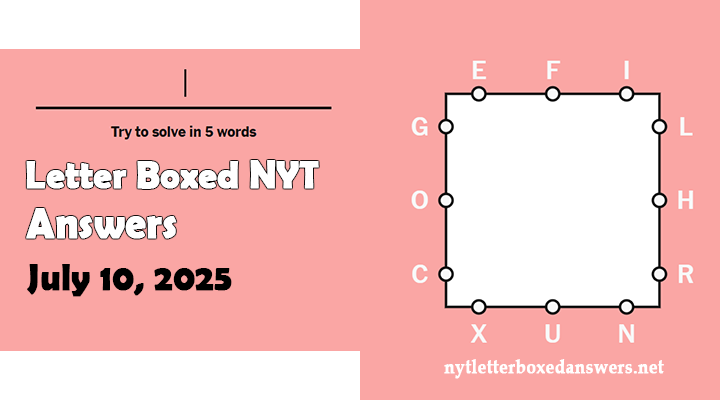NYT Letter Boxed quiz for Thursday July 10, 2025 is released. We came up with Letter Boxed July 10 2025 Answers and Hints for you. With the help of these hints, you will be able to guess the words of letter boxed quiz without revealing the answers and get the solution.
| Top | Right | Bottom | Left |
|---|---|---|---|
| EFI | LHR | XUN | GOC |
| Two Words Solution | ||
|---|---|---|
| FLEXING | GROUCH | |
| FLEXING | GROUCHING | |
| FLEXING | GROUCHO | |
| FLEXOR | RUCHING | |
| Three Words Solution | ||
|---|---|---|
| CHINONE | ENGULF | FLEXOR |
| CHOICE | ENGULF | FLEXOR |

Word 01:
This 7-letter word starts with F and ends with G; the act of bending or tensing a muscle or object.
Often done to show off strength or tone.
Common in gym culture and bodybuilding.
Used metaphorically for showing off wealth or status.
Related to movement in limbs and joints.
Opposite of relaxing or extending.
Can be involuntary or deliberate.
Found in phrases like “flexing your muscles.”
Implies confidence or readiness to act.
May also be used in casual slang for boasting.
Word 02:
This 6-letter word starts with G and ends with H; a person who is habitually irritable or complaining.
Often associated with grumbling or grumpy moods.
Used to describe a cranky or sour-tempered individual.
Can refer to temporary or chronic bad temper.
Found in phrases like “don’t be such a grouch.”
Related to mild annoyance, not outright rage.
Common in cartoons and family talk.
May be used playfully or insultingly.
Shares root with “grumble” or “gripe.”
Synonym of curmudgeon or sourpuss.
Word 01:
This 7-letter word starts with F and ends with G; the act of bending or tensing a muscle or object.
Often done to show off strength or tone.
Common in gym culture and bodybuilding.
Used metaphorically for showing off wealth or status.
Related to movement in limbs and joints.
Opposite of relaxing or extending.
Can be involuntary or deliberate.
Found in phrases like “flexing your muscles.”
Implies confidence or readiness to act.
May also be used in casual slang for boasting.
Word 02:
This 9-letter word starts with G and ends with G; the act of complaining or expressing dissatisfaction.
A continuous or habitual state of griping.
Suggests low-level but persistent annoyance.
Often done aloud or under one’s breath.
Describes someone’s tone or behavior.
Not quite anger—more like grumbling discontent.
Verb form related to being a grouch.
May irritate others or be dismissed.
Appears in dialogues or internal monologue.
Used to show dissatisfaction in a petty way.
Word 01:
This 7-letter word starts with F and ends with G; the act of bending or tensing a muscle or object.
Often done to show off strength or tone.
Common in gym culture and bodybuilding.
Used metaphorically for showing off wealth or status.
Related to movement in limbs and joints.
Opposite of relaxing or extending.
Can be involuntary or deliberate.
Found in phrases like “flexing your muscles.”
Implies confidence or readiness to act.
May also be used in casual slang for boasting.
Word 02:
This 7-letter word starts with G and ends with O; refers to Groucho Marx, a famous comedian with a mustache and cigar.
Known for witty one-liners and fast-talking humor.
Iconic member of the Marx Brothers.
Wore glasses, painted mustache, and fake eyebrows.
Often referenced in comedy or film history.
Synonymous with sarcastic or dry humor.
His image is used in disguise glasses.
Major influence on slapstick and vaudeville.
A symbol of old-school, irreverent comedy.
Recognized by name alone in pop culture.
Word 01:
This 6-letter word starts with F and ends with R; a muscle that causes bending at a joint.
Works opposite to an extensor muscle.
Commonly found in arms and legs.
Helps you curl, bend, or draw inward.
Vital in locomotion and basic movement.
Used in anatomy and physical therapy.
Present in all vertebrate limbs.
Involved in weightlifting or rehabilitation.
Named after the Latin verb “flectere.”
Injury to this type of muscle can affect range of motion.
Word 02:
This 7-letter word starts with R and ends with G; a sewing technique involving gathered fabric for decorative effect.
Often used in formal wear or evening gowns.
Creates a rippled or pleated texture.
Enhances garment shape or visual interest.
Popular in bridal and couture fashion.
Done by gathering fabric along a seam.
Can elongate or slim the appearance of a dress.
Associated with femininity and elegance.
Used around bodices, sleeves, or waistlines.
French-origin term meaning “to wrinkle or pleat.”
Word 01:
This 7-letter word starts with C and ends with E; a chemical compound also known as quinone, used in dyes and biologic processes.
Structurally related to aromatic ketones.
Important in photosynthesis and respiration.
Appears in coenzyme Q and vitamin K.
Used industrially in oxidation and pigments.
Yellow crystalline compound with a strong odor.
Found in organic chemistry textbooks.
Derived from aromatic compounds like phenol.
Can be synthetic or biologically produced.
Studied in chemistry labs and pharma research.
Word 02:
This 6-letter word starts with E and ends with F; to completely cover, swallow, or overwhelm.
Used for water, flames, or abstract forces.
Suggests total immersion or destruction.
Appears in natural disaster reports.
Emotionally, may describe being overwhelmed.
Related to devour, consume, or flood.
Seen in expressions like “engulfed in flames.”
Has powerful and vivid imagery.
Often paired with disaster or passion.
Implies inescapable and sudden force.
Word 03:
This 6-letter word starts with F and ends with R; a muscle that causes bending at a joint.
Works opposite to an extensor muscle.
Commonly found in arms and legs.
Helps you curl, bend, or draw inward.
Vital in locomotion and basic movement.
Used in anatomy and physical therapy.
Present in all vertebrate limbs.
Involved in weightlifting or rehabilitation.
Named after the Latin verb “flectere.”
Injury to this type of muscle can affect range of motion.
Word 01:
This 6-letter word starts with C and ends with E; the act or power of selecting among alternatives.
Often linked to decisions or preferences.
Found in ethics, marketing, and daily life.
Can be difficult, simple, or life-changing.
Used in contexts like “freedom of choice.”
May describe options on a menu or test.
As an adjective, can mean superior or excellent.
Indicates variety and agency.
Derived from Old French choisir.
Can be random, rational, or emotional.
Word 02:
This 6-letter word starts with E and ends with F; to completely cover, swallow, or overwhelm.
Used for water, flames, or abstract forces.
Suggests total immersion or destruction.
Appears in natural disaster reports.
Emotionally, may describe being overwhelmed.
Related to devour, consume, or flood.
Seen in expressions like “engulfed in flames.”
Has powerful and vivid imagery.
Often paired with disaster or passion.
Implies inescapable and sudden force.
Word 03:
This 6-letter word starts with F and ends with R; a muscle that causes bending at a joint.
Works opposite to an extensor muscle.
Commonly found in arms and legs.
Helps you curl, bend, or draw inward.
Vital in locomotion and basic movement.
Used in anatomy and physical therapy.
Present in all vertebrate limbs.
Involved in weightlifting or rehabilitation.
Named after the Latin verb “flectere.”
Injury to this type of muscle can affect range of motion.

Chris Brown is a passionate word game love and problem solving expert. With over 15 years of experience in solving puzzle challenges, he provides daily NYT Letter Boxed answers, tips and strategies to help other players so that they can improve their solving skills. Whether you are stuck on a tricky puzzle or looking for new techniques, Chris is here to guide you with his expert solutions.